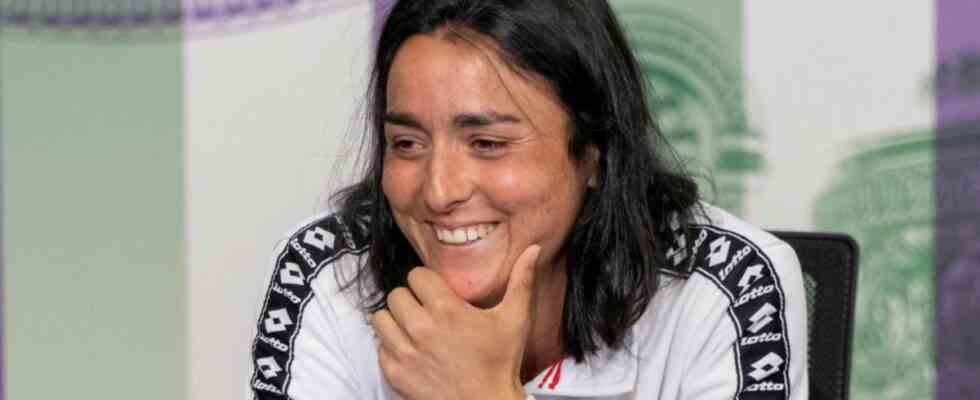There she sat, the woman who is called “Minister of Happiness” in her homeland, and beamed. With a grin, Ons Jabeur explained how she felt about having received this title. “I mean, it’s nice that they call me that,” she said. “It’s really incredible. You might think hiring a minister of happiness. It’s funny,” she grinned even more now, “the current minister also says to me: ‘Hello, Minister!'” Jabeur, who is a great storyteller , added a punch line. When she was immediately asked if she thought Boris Johnson had done the right thing by stepping down as Prime Minister, she quipped: “I don’t know, I’m the Minister of Happiness.” Of course there was much laughter in the All England Club press conference room and no one could argue.
Jabeur’s purview, as was widely known even before this tournament, is truly to please people. However, her role already has a certain political significance, and she has long been concerned with more than her clever, varied tennis. The 27-year-old from Ksar Hellal south of Monastir is currently number two in the world rankings and has now played her way into the Wimbledon final after winning the semifinals against the acclaimed tennis mother Tatjana Maria.
Jabeur is rushing from record entry to record entry. So now she is the first woman from Tunisia, the Arab world and Africa to fight for the biggest title in her sport. She is considered a great role model by many, her compatriots, women, children and those who believe in the ideals of a free world with equal rights. Jabeur has undoubtedly become a socially relevant figure, the most significant one at the top of the world in women’s tennis.
Jabeur’s opponent Yelena Rybakina qualified for the last duel almost unnoticed
Her opponent this Saturday will be Jelena Rybakina, who qualified for the last duel almost unnoticed. In the semifinals she appeared on Center Court for the first time and with her uncompromising style she clearly beat Simona Halep 6: 3, 6: 3 put in their place. Her story is quite different, but also a highly political one. Her height – 1.83 meters – also makes her game appear big and powerful. But as with Jabeur, Rybakina has a completely different note, and it must be said that a finale at this traditional venue has not been so loaded with meaning for a long time.
Almost motionless, reels off her offensive, courageous baseline tennis: Jelena Rybakina.
(Photo: Antoine Couvercelle / Panoramic / Imago)
Rybakina, 23, was born in Moscow. That she can take part in Wimbledon is because she represents Kazakhstan. In 2018 she had already changed nation and federation, she explained in detail at the press conference in good English that she was not progressing in her development at the time, even though she had been a successful junior. Kazakhstan then offered her a lot more support, and she accepted the offer.
Basically, all of this was known for a long time, but given the circumstances that Wimbledon excluded all Russian and Belarusian professionals from this tournament edition due to the Russian war of aggression against Ukraine, Rybakina came under pressure in her media round, whether she wanted it or not.
The Moscow-born Kazakh Rybakina tried, at times politely, at times firmly, to make it clear: I live a different life now
You could tell how uncomfortable she was about these topics, but she tried to send the message politely and sometimes firmly: I’m living a different life now. And that’s probably the case. Rybakina emphasized that she is now “stationed on the tour” because “I travel every week”. Between tournaments she trains in Slovakia. She also practiced several times in Dubai. “I don’t live anywhere, to be honest,” she said, denying that she often stays in Russia. She was not more specific at this point. She left open whether she still has a place of residence in Moscow.
As if she were at a picnic with tennis balls: Yelena Rybakina the day before the women’s final.
(Photo: Julian Finney/Getty Images)
There were two extraordinary press conferences with the two finalists, global issues invaded this subdued, awe-inspiring space in which the tennis cosmos usually prefers to deal with itself.
With Jabeur, the lighter, the brighter aspects prevailed. She loves barbecues and is happy that the final falls on a special holiday at home, Eid al Adha, the Islamic festival of sacrifice, is now taking place.
Sometimes makes the most difficult shots look easy: Ons Jabeur goes into the Wimbledon final as a favorite and has a 2-1 lead in a direct duel with Kazakh opponent Jelena Rybakina. Jabeur won the last two games (both in 2021).
(Photo: Adrien Dennis/AFP)
Rybakina, 23rd in the world rankings and noticed a year ago as a quarter-finalist at the French Open, also embodied a lot of joy. Her sister accompanies her, she is her talisman, she said. She will be honored to perform in front of the Royal Box, as Catherine, the Duchess of Cambridge, will also present the Venus Rosewater Dish. But she repeated remarkably often that the Kazakh association president had also congratulated her – she was aware that many pay attention to such nuances. In this way she also distanced herself from her country of birth.
On this Saturday afternoon, however, the sport will definitely come into its own, and the duel between the two will also be a duel of different temperaments. The extroverted Jabeur has already announced that she expects a “special celebration” if she succeeds. The introverted Rybakina, who almost motionless is reeling off her offensive, courageous baseline tennis, at least promised if she succeeded in the big coup: “I’ll smile.” And when she said that, she actually smiled. It suited her.

